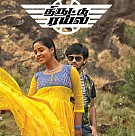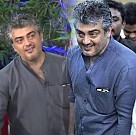“THE OSCAR WINNER WAS AMAZED WITH THE EXTENT OF KAMAL SIR’S KNOWLEDGE” – KUNAL RAJAN
Interview Team : Sudharshan; BalasaravananAn interview with Sound Designer Kunal Rajan of Vishwaroopam and Uttama Villain fame, by Sudharshan Giridhar
PHOTOS & STILLS - GALLERY
"I'm Kunal Rajan"
“I hail from Pondicherry and have a Bachelor’s Degree in Sound. I’m really not sure about how the passion began. Sound designing has always fascinated me. The way sound navigates within the theater excites me. I wanted to be someone, who could do that. With Hollywood as my ambition, I moved to America 10 years back. I started with short films and a few festival movies. With time and experiences, I started getting bigger movies and now I’m working on a lot of Hollywood projects.”
Introducing Kunal Rajan, the passionate, young Sound Designer of Uttama Villain… Also having been a part of Vishwaroopam, the techie from Pondy has enjoyed long companies of Ulaganayagan Kamal Haasan and no wonder he has a lot to talk.
On the Hollywood front, Rajan is eagerly looking forward to the big October release of his next work, Jem and the Holograms, directed by Jon M Chu, the man who helmed G.I.Joe Retaliation, Step Up 3D and Step Up 2: The Streets.
The work of a sound designer…
Whatever you hear in the theater… Most of the Indian movies are dubbed nowadays. Beginning from merging the dialogues to adding sounds like, footsteps, gunshots, vehicles, ambience noise and everything else is done in the studio.
Simultaneously, the composer would work on the BGM. Once that’s done, we mix everything and deliver it.
What’s Craig Mann’s part in Uttama Villain then?
Once we are ready with the dialogues, sound effects and music, we take those to the mixing engineer, who in this case was Craig Mann. He checks the sound levels of each track and mixes them according to the directors’ requirements.
I do understand Craig Mann is an Academy Award Winner, but how is his involvement a value addition, rather than that of an Indian techie?
Just the perspective. Why do we sometimes take a foreign cinematographer onboard? In India, we keep our movies loud. We design it loud. In the west, we equally give importance to the softness in sound. This difference in the sound dynamics is what Craig Mann contributed to Uttama Villain.
From my part, I have to maintain a balance between the eastern and the western styles while working on an Indian project. If I keep it too Hollywood-esque, it might not work in Indian theaters and if I stick to the India style completely, there’s no purpose for the filmmakers to come all the way to Hollywood.
In India, we keep our movies loud.
So, are the Indian and Western styles differentiated only based on the decibel levels?
Not really. Here in Hollywood, we take a lot of time for sound designing. The team working in the department is bigger.
Take Vishwaroopam for example. There’s a seven minute long battle sequence in the film that comes just before the interval. In that sequence if you notice, there are so many different kinds of sounds used. The weapons, drones and the whole ambience in that sequence are of large varieties that it wouldn’t sound authentic if we use random helicopter or gun sound. Instead we did some research on those drones and guns and created apt sounds for those. Also, if we had repeated the same effects, the seven minute sequence would have been boring. It is also our job to keep the audiences hooked with our varieties.
It is also our job to keep the audiences hooked with our varieties.
Coming back to Craig Mann… What are his views on Uttama Villain?
He loved it. This is the first Indian film he’s working on. When I asked him for Uttama Villain, he was so excited. He had just completed another musical then – Whiplash and he said he definitely would love to do an Indian musical.
Craig enjoyed working with Kamal sir. The Oscar winner was amazed with the extent of Kamal sir’s knowledge in the field of sound.
Craig enjoyed working with Kamal sir
Talking about Kamal Haasan’s “sound knowledge”…. Could you be more elaborate?
(laughs) Must I say how sound his knowledge is? He is very knowledgeable in every aspect of filmmaking. But what I like the most about him is, he always comes here (to USA) and be with us during the whole process. He always comes with the full plan and with clarity on what he wants and how things have to be. At the same time, he lets us work our way. He’s also very specific when he wants certain things changed.
There are also instances where, he’d suggest us do something in a certain way, but we’d tell him the issues that might arise if we do thus. But he’d come up with an unbelievable technical solution for that too and it’d turn out to be brilliant. Kamal has solutions for all kinds of problems. It’s so easy to work with him.
Another good thing about him is that he gives us time to work on the project and doesn’t hurry us.
“The sound in Uttama Villain would be much more realistic, unlike Vishwaroopam, where everything was larger than life” – You said this in a recent interview. Could you give a bit more detail?
Uttama Villain and Vishwaroopam are two very different kinds of movies. The former will have very subtle, realistic design, considering it is a drama and its story takes precedence than the technical departments.
Let’s say you are working on a park scene where a boy and girl are talking… How would you design sound for the scene?
Assuming they are lovers and that the mood is happy, we’d give some breeze, kids playing and birds chirping sounds. But, if it’s a break up or a sad scene, I cannot add the same sounds here, as they’d spoil the mood of the sequence. I’d have to go with a totally different set of effects.
How do you collect those sounds? Sometimes you might have to provide sounds that we don't often come across in our daily lives.
We record some sounds and we also have a few companies that collect sounds. We buy libraries from them. As far as the sounds that are never heard of or rarely come across, we create them. Let’s take Jurassic Park for example. There’s no living being, who has heard the sound of a dinosaur. What the sound designer did was he took the sounds of a lion roaring, an elephant’s trumpet, and a baby’s cry. Then, the baby’s cry was stretched and with some pitch shift, was mixed together with the other two sounds to arrive at a sound that we till day recognize as dinosaur’s.
Another frequently used sound is the punch. There are a variety of sounds. Sometimes we break watermelons and cabbages to create the sound. There are a lot of ways to create effects. The question is do you want realistic or over the top sounds.
There’s no living being, who has heard the sound of a dinosaur
As a commoner, how do we judge sound designing and how do we appreciate?
As an audience, you shouldn’t be able to notice our work. If you start noticing our work much, that means we aren’t doing a good job. Our job is to be invisible and it is very crucial that we remain that way.
One change that you want to see, which will benefit the field of sound…
There’s one thing I really want to see happen, which is standardization of theaters and calibration of speakers in all theaters. You watch a film in one theater and watch it again in another theater a few days later, the experience will be totally different. They keep the sound levels high in few theaters and low in few other theaters.
For example, for a Hollywood film, I mix it at certain level of volume and inform the theaters to maintain it at that level while projecting. But while mixing for an Indian film, I have to work with a wide range of volumes, because here theaters don't practice a common standard. Each one projects movies with different levels of sound. That was my fear for Uttama Villain too.
Do you think the sound designers are recognized enough in our country?
It’s a bit less, but I can live with that. After all, our job is to be invisible.
FACEBOOK COMMENTS
OTHER LATEST TEXT INTERVIEWS
SOUND DESIGNER KUNAL RAJAN RELATED NEWS
- Kamal Haasan's sinister side in all its glory
- Kamal begins with Prakash Raj blissfully
- After 12 years with Kamal Haasan…
- ''Kamal sir loved the track and was really enthusiastic while recording''
- The only firm with the 'sixer'
- Ilayathalapathy Vijay at the top, ahead of Suriya and Vikram
- Uttama Villain continues its strong performance…
- Uttama Villain joins a select league of high-performers
- ''85% of the comments have been overwhelmingly positive''
- A successful 27 hour marathon for Uttama Villain. Now for Vaalu ?
- Uttama Villain and Vai Raja Vai get it!
- Uttama Villain to release from today….
- Two for Uttama Villain and 3 for OK Kanmani...
- Uttama Villain, early show cancelled
- It is 6 for Kamal and 5 for Rajinikanth
SOUND DESIGNER KUNAL RAJAN RELATED LINKS
- Thoongavanam Telugu Pressmeet
- Madhavan I II III IV V VI VII VIII IX X XI
- Madhavan | Stars Shoot Themselves ! - Slideshow
- Madhavan | Suriya's six-pack & Vikram's visual impairment - some of the biggest homework ! - Slideshow
- Madhavan | Top Stars' Autographs - Slideshow
- Madhavan | Ipdi irundha Superstars eppadi aiytanga - Slideshow
- “Uttama Villain with K Balachander sir is a good parting gift”
- Uttama Villain remains No.1 | BW Box Office
- My Marghadarsi!
- Uttama Villain Release Press Meet
- Nassar - "Uttama Villain will be a comedy treat!"
- "Kamal sir's thinking is unimaginable" - Ghibran
- Pooja Kumar - "I will do anything for Kamal Haasan"
- Andrea Interview - "Girls are used as props in movies"
- Papanasam Teaser
- Uttama Villain Movie Review
- Uttama Villain Movie Review
- "Act of God is a very subjective statement to me" - Kamal Haasan










